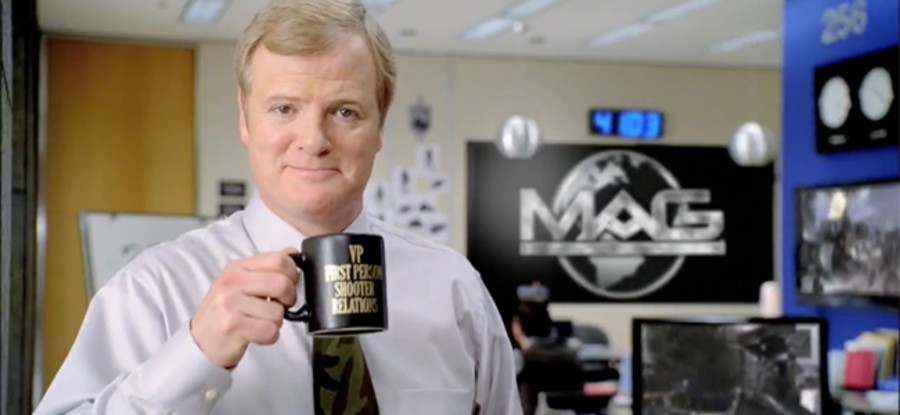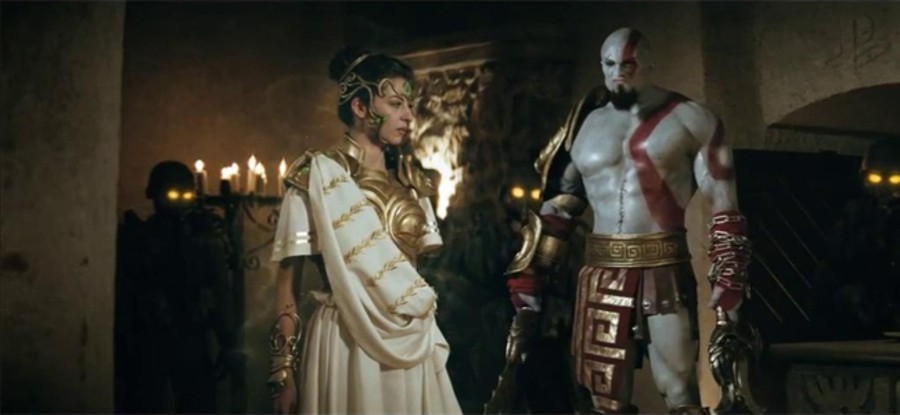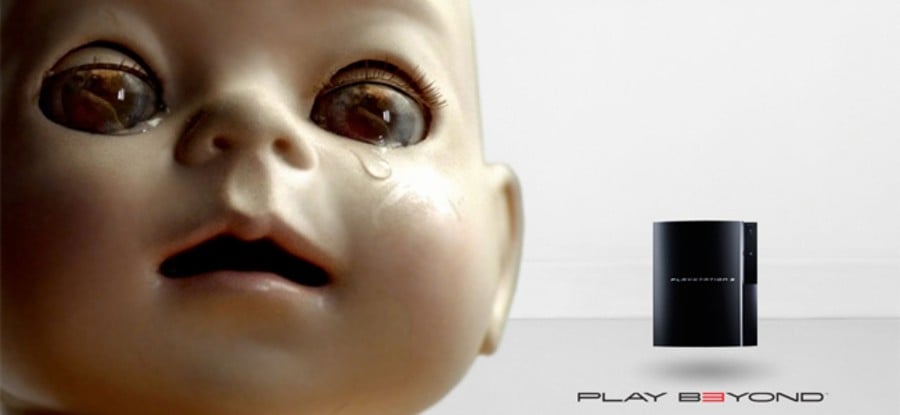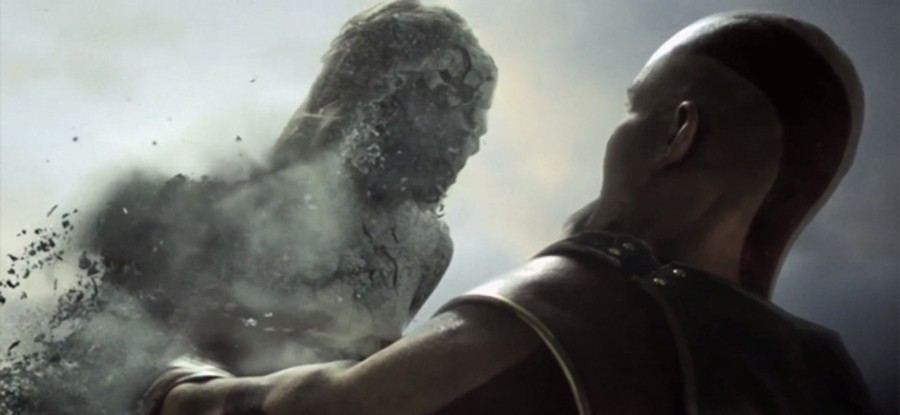
Everything seems to go wrong when you’re going through a rough patch. Sony learned this lesson in the hardest way possible with the launch of the PlayStation 3. “The next-generation doesn’t start until we say so,” former PlayStation president Kaz Hirai declared. But the promise of great things wasn’t enough to make up for the system’s belated arrival. And despite attempts to recreate the magic of David Lynch’s baffling ‘The Third Place’ marketing campaign, the unsightly montage of a tearful baby didn’t exactly help the over engineered console’s teething troubles.
There have been decent PlayStation commercials over the past seven or so years, of course, but none of them have had a particularly big impact on the brand’s success. Kevin Butler was nothing short of a phenomenon in key gaming circles at his peak, but it always felt like he was preaching to the converted rather than bringing in new consumers. Taking shots at Microsoft’s motion solution and talking trash with company president Jack Tretton were all highlights in the character’s short reign, but how many consoles did the spots actually sell? We’ll probably never know, but the platform holder’s decision to scrap (and later sue) its manufactured mascot suggests that they weren’t having a particularly big impact at all.

A similar criticism can be pointed at ‘Michael’, the daring short that aimed to unite some of gaming’s greatest mascots in one well produced short. It was, in many ways, a masterpiece, prompting 11 million views on YouTube and drawing attention back to the PlayStation brand. But despite being a celebration of traditional gaming at a time when the competition was obsessed with casual games and applications, it failed to promote the platform outside of hardcore circles. After all, watching Uncharted’s loveable protagonist Nathan Drake chatting up Final Fantasy XIII’s Lightning is only exciting if you’re familiar with the characters. And at that point, it’s safe to assume that you already own a console.
We’ll probably never see a commercial in that mould again. Sony announced last night that it had ditched its marketing partner of eight years, Deutsch, and recruited the services of BBH New York. The firm already has a laundry list of high-profile clients to its name, including Google Chrome and Axe body spray. Meanwhile, its creative director John Patroulis is no stranger to the video game industry having already worked with Microsoft on Halo 3’s popular ‘Believe’ campaign. That bodes well for the platform holder moving forward.
It’s going to be interesting to see which direction the manufacturer adopts. We can’t help but feel that the days of ‘Double Life’ are long gone, and that the company will need to be more upfront about its next system when it eventually arrives. Of course, whichever direction it takes, it’s pointless creating a great advertisement if the visibility is low, which is perhaps an area that has frustrated fans of PlayStation more than the commercials themselves.
But that raises an interesting question in itself: is every game deserving of a wide-reaching television campaign? And if not, should the title even exist in the first place? There’s been concern this week that Sly Cooper: Thieves in Time has been sent out to die against a heavily promoted Dead Space 3, and it’s hard to disagree – but the platform holder has to place its bets carefully. God of War: Ascension, due out in less than four weeks, just received a Super Bowl advertisement – albeit limited to the online stream – which should have increased awareness of the title significantly. Should its place have been taken by Sanzaru Games’ platformer? Absolutely not.

That’s not a slight against the stealthy sequel at all, but some games simply demand more marketing spend than others. God of War: Ascension is a system seller; it’s the latest entry in a series that has sold 21 million copies over the past eight years. Sly Cooper: Thieves in Time – no matter how fun – simply can’t compete with that, and was always destined to be a niche game. Fans need to deal with that fact.
The reality is that there’s only so much marketing spend available in a year, and the more releases there are, the more that budget gets stretched. The good news is that Sony is particularly good at online promotion, which often gets ignored when pundits criticise the company’s advertising spend. The PlayStation Blog alone is a stroke of marketing genius, informing consumers directly about the latest products, and offering a direct line of communication between developers and fans. It may only target a limited subset of the market, but that’s exactly where games like Sly Cooper: Thieves in Time are able to thrive.

And let’s not pretend that the audience is small. At the time of writing the official North American PlayStation Twitter account – which is fed by posts from the PlayStation Blog – has 1,574,814 followers. That’s excluding international territories. Compare that to both Xbox and Nintendo’s comparative accounts – which have 828,118 followers and 338,595 followers respectively – and there’s no argument over which brand is ruling the online stakes. Facebook paints a similar picture, with the official PlayStation page boasting 29.5 million ‘likes’ compared to Xbox’s 20.4 million and Nintendo’s 2 million.
And that proves that there are positives to take from Sony’s perceived promotional predicament. If the platform holder can complement its dedicated online presence with a more attractive and visible mainstream campaign, then it’s easy to see how current concerns about its marketing clout could be reversed. The issue is down to new recruit BBH New York to solve – let’s keep our fingers crossed that they are up to the task.
What do you think are the problems with PlayStation’s current marketing strategy? How do you think it could improve its promotional tactics? What type of commercials would you like to see accompany the launch of the PS4? Let us know your thoughts in the comments section below.





Comments 11
Visibility seems to be something they could definitely work on. I loved the Michael commercial, but I only knew about it from gaming sites and watched it on YouTube. PS+ is genius and they could talk that up in a commercial comparing it to xbox live gold. Of course we'll find out in a couple weeks what else they can talk up for the ps4 — hopefully cloud streaming and remote play. And I maybe crazy but I really think offering 1 or 2 day rentals on games with cloud streaming would be pure genius.
If I remember correctly the most fail marketing campaign was the marcus psp one.
I feel like this article's title should be changed to: What's the Problem with PlayStation Advertising?
=/
I thought the PS Blog only existed for people to complain about PS+
As for commercials - nobody watches tv anymore so I don't see the point. Just put Seth Rogen in an ad playing your game and put it on FB or Youtube. Or place an ad on The Kindle. Or in whatever gaming magazines still exist. (I get the one with my Gamespot Pro membership but I don't recall the name.)
The Vita and 3DS and early PS3 didn't sell b/c of lack of commercials, they didn't sell b/c they were too expensive. And the games don't sell b/c they are too expensive. Everybody knows game prices drop - maybe half - in a few months or on BF. Unless it's online multiplayer people wait. Advertising isn't going to help, cheaper games are going to help.
And there are only so many people in the world who want a PS3 or Xbox or Wii, no matter what the price or the ads at some point you just run out of customers. And thanks to Apple those customers are running out pretty quick.
I wish Sony and Nintendo the best, I don't care either way about MS as i think it's possible the Xbox 720 won't even play games, just HBO and Skype, but as a famous man once said "the economy. stupid".
@Savino
They're the most annoying fanboys on the net for sure. Not to say Sony and MS fanboys aren't incredibly annoying either but Nintendo fanboys lately have taken it to the next level. They used to be the most tolerable of the bunch but now they just flip out about everything. Anytime some news is posted about Nintendo that isn't 110% positive they go on and on about how everybody is against them but it's ok because their corporate mother will rise up in the end and crush all because they can do wrong. It's beyond ridiculous. You can specifically tell the difference between the Sony and Nintendo fanbases by visiting this site and Nintendo Life. Here you can make a critical statement about Sony without people jumping down your throat. Suggest you don't like something Nintendo does on NL and all hell breaks loose.
@Gamer83 Fanboys are annoying period, PC and Nintendo fan boys just stand out the most. One is just incredibly elitist while the other is ready to burn you at the stake for speaking out against their favorite company or speak positively about the mobile market.
As @rjejr said there are only so many people that would be interested in your product and unfortunately the market is shrinking due to any casual players being satisfied either buy their current console(s) or mobile games. Why should they buy a new one if they're happy with what they have especially for $200-$300?
Heck, when my aunt found out I was buying a PS3 back when it was still $300 she thought I should wait for a price drop and wondered why I want one if I already have a Wii. She said the same thing when I bought my 3DS after the price drop to $170, that right there shows how people outside the core market thinks.
Kevin Butler: VP of the unemployment line. Sad. When things went south with that they really went south! He was quite a good campaign/mascot, and Sony has thrown him to the wolves while taking a big old chuck out of his rear end themselves.
@Savino
I like Nintendo a lot as well, I've got no problem with the company. It's the fanboys that take things too far, I'm sick of seeing stupid crap like everybody who writes something slightly negative is 'against' Nintendo or worse the laughing at Vita sales and hoping for Sony to disappear. They've basically become what the Sony fanboys were back in 2007.
Kevin Butler made a mistake. He was caught advertising with another company. His relationship with Sony would never have been the same. BUT THERE'S JUST NO MAN LIKE HIM! sob
I hope to see almost as many different campaigns as there are types of games/ers. You can't catch all the fish with a single worm, no matter how big it is. Ahem.
i think the main problem is they don't advertise enough 9 times out of 10 when a game advert is on TV it always ends with the XBOX logo and lets be honest we all watch TV and when a game advert is followed by "on XBOX 360" your not really going to think PlayStation are you?
also a lot of US run sites plug the 360 version of a game more than the others and as a lot of the sites are US run you can see where i'm going here right?
Show Comments
Leave A Comment
Hold on there, you need to login to post a comment...